| Visit to Uncle Pete's Cabin by A. A. Hayes, excerpted from: The Cattle Ranches of Colorado, Harper's New Monthly Magazine, Vol. LIX, June, 1879 |
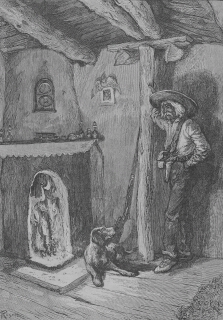
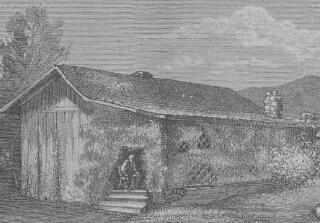
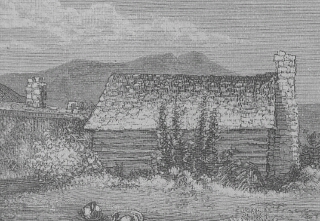
The traveller who journeys westward in our favored land should make up his mind to accept such
military or judicial rank and title as may be conferred upon him. "I don't half like," once remarked a
Scotch fellow-traveller of the writer, "the promotion backward which I receive. East of Chicago, I
was Colonel; at Chicago, I was Major; at Omaha, a man called me Captain, and offered me dinner for
35 cents!" One of the group, after a careful survey of the face and figure before him, the kindly yet
keen expression, and the iron-gray whiskers, replied, "You ain't Colonel wuth a cent. I allow that
you're Jedge!" And "Jedge" he was from that time forth.
So when, a short time since, an "honest miner," with whom the writer was conversing amicably at
Kansas City, addressed my travelling companion as "Colonel," I well knew that his rank was finally
settled. So the "Colonel," who might be called unattached, having no regiment and no staff, but
having what was far better for his peaceful and descriptive purposes, the companionship of an artist
coadjutor, whose nautical achievements had gained for him the distinguished naval sobriquet of
"Commodore," settled himself in his seat, and headed off in the direction of Colorado.
We were going to find out if Colorado will "fill the bill, and of all the phases of life, the herding and
breeding of cattle easily commanded our attention at the outset. What this is in theory we all know,
the primitive Scriptural occupation, the grand, free, independent, health-giving, out-of-door existence,
the praises of which have been sung through all ages. To how many pale, thin, hard-working city
dwellers does the thought of "the cattle upon a thousand hills," the rare dry air of the elevated
plateau, and the continual and ennobling sight of the mighty mountains bring strangely vivid emotions
and longings!
"Now there's some folks," once said an old plainsman, "who complain of a trip across the country
in a Pullman car. I wonder what they'd'a said if they'd had to ride in a bull team or drag a hand-cart
all the way?"
==================
We left the train at Pueblo, Colorado, met and entertained by our old friend, Major Stanton. The 25
people who were there in 1865 have grown to between 6-7,000. It has 2 daily papers, two depots,
two banks and 2 schoolhouses. Like many other western settlements, it has had, too, its baptism of
blood. It was a trading post of stout old William Bent, and became other than this only in 1858, when
the gold excitement began, and "Pike's Peak or Bust" was the motto painted on the canvas cover of
each prairie schooner or emigrant wagon. One may still see, near the handsome stone station of the
Atchison, Topeka and Santa Fe railroad, the remains of the old fort into which, when, on Christmas
day, 1854, the residents, thoughtless of danger, were gathered around the fire and enjoying the
festive season, the Ute Indians broke, with brandished tomahawks and wild war cries, and
massacred nearly all.
Throughout the region that is tributary to Pueblo are scattered cattle ranches, great and small,
including the immense Craig property. But, it was to "Uncle Pete Dotson's," situated about thirty
miles southwest from the town, that we were bound. The trip would have gone well, but for the
Colonel's desire to make the journey on the back of an animal known as a "burro." Useful he may
possibly be; ornamental he certainly is not; obstreperous and unmanageable he most certainly is. In
vain, did I plead that no more ridiculous sight could be found east of the mountains than his tall form,
clad in the garments of civilization, mounted on this diminutive brute. But he won the argument,
including the plea that I accompany him on same.
Major Stanton had provided us a convenient vehicle, with a basket under the seat, and two fine
horses in front. And, among the almost human attributes of that noble animal, the horse, is a dislike
for burros and an utter unwillingness to associate with them. Starting to meet our friend, we turned
a corner and met the wagon. The horses reared and plunged, the Colonel's burro balked, the
Commodore's wheeled around, and the two came in collision. Fortunately, this event was just what
was needed to change the Colonel's mind and we took our seats in the covered wagon and
ascended the hill heading out of South Pueblo.
military or judicial rank and title as may be conferred upon him. "I don't half like," once remarked a
Scotch fellow-traveller of the writer, "the promotion backward which I receive. East of Chicago, I
was Colonel; at Chicago, I was Major; at Omaha, a man called me Captain, and offered me dinner for
35 cents!" One of the group, after a careful survey of the face and figure before him, the kindly yet
keen expression, and the iron-gray whiskers, replied, "You ain't Colonel wuth a cent. I allow that
you're Jedge!" And "Jedge" he was from that time forth.
So when, a short time since, an "honest miner," with whom the writer was conversing amicably at
Kansas City, addressed my travelling companion as "Colonel," I well knew that his rank was finally
settled. So the "Colonel," who might be called unattached, having no regiment and no staff, but
having what was far better for his peaceful and descriptive purposes, the companionship of an artist
coadjutor, whose nautical achievements had gained for him the distinguished naval sobriquet of
"Commodore," settled himself in his seat, and headed off in the direction of Colorado.
We were going to find out if Colorado will "fill the bill, and of all the phases of life, the herding and
breeding of cattle easily commanded our attention at the outset. What this is in theory we all know,
the primitive Scriptural occupation, the grand, free, independent, health-giving, out-of-door existence,
the praises of which have been sung through all ages. To how many pale, thin, hard-working city
dwellers does the thought of "the cattle upon a thousand hills," the rare dry air of the elevated
plateau, and the continual and ennobling sight of the mighty mountains bring strangely vivid emotions
and longings!
"Now there's some folks," once said an old plainsman, "who complain of a trip across the country
in a Pullman car. I wonder what they'd'a said if they'd had to ride in a bull team or drag a hand-cart
all the way?"
==================
We left the train at Pueblo, Colorado, met and entertained by our old friend, Major Stanton. The 25
people who were there in 1865 have grown to between 6-7,000. It has 2 daily papers, two depots,
two banks and 2 schoolhouses. Like many other western settlements, it has had, too, its baptism of
blood. It was a trading post of stout old William Bent, and became other than this only in 1858, when
the gold excitement began, and "Pike's Peak or Bust" was the motto painted on the canvas cover of
each prairie schooner or emigrant wagon. One may still see, near the handsome stone station of the
Atchison, Topeka and Santa Fe railroad, the remains of the old fort into which, when, on Christmas
day, 1854, the residents, thoughtless of danger, were gathered around the fire and enjoying the
festive season, the Ute Indians broke, with brandished tomahawks and wild war cries, and
massacred nearly all.
Throughout the region that is tributary to Pueblo are scattered cattle ranches, great and small,
including the immense Craig property. But, it was to "Uncle Pete Dotson's," situated about thirty
miles southwest from the town, that we were bound. The trip would have gone well, but for the
Colonel's desire to make the journey on the back of an animal known as a "burro." Useful he may
possibly be; ornamental he certainly is not; obstreperous and unmanageable he most certainly is. In
vain, did I plead that no more ridiculous sight could be found east of the mountains than his tall form,
clad in the garments of civilization, mounted on this diminutive brute. But he won the argument,
including the plea that I accompany him on same.
Major Stanton had provided us a convenient vehicle, with a basket under the seat, and two fine
horses in front. And, among the almost human attributes of that noble animal, the horse, is a dislike
for burros and an utter unwillingness to associate with them. Starting to meet our friend, we turned
a corner and met the wagon. The horses reared and plunged, the Colonel's burro balked, the
Commodore's wheeled around, and the two came in collision. Fortunately, this event was just what
was needed to change the Colonel's mind and we took our seats in the covered wagon and
ascended the hill heading out of South Pueblo.
Thence we drove out over the great plain, the excellent road being a strip from which the grass had
been worn away, and which was probably marked out originally by two furrows cut with a common
plough, or even by a wagon track. From the mountains nearby flows out the San Carlos Creek,
running in a northeasterly direction to the Arkansas River, and its course was made visible as we
approached it by the fringes of cottonwood trees. After awhile, the valley lay behind us and the
foot-hills began to shut out the range, but Pike's Peak loomed up as grandly as ever. Finally, we
turned into a great corral and stopped at a rustic stile. In a few moments Uncle Pete Dotson came
up the path from the house and gave us a cordial greeting.
A quarter of a century ago, this gray-bearded veteran, then a hale and vigorous West Virginian,
started to drive cattle to California, stopped at Salt Lake, became the U. S. Marshal for the Territory,
and was there when Brigham Young was in his glory and Albert Sidney Johnston wintered in the
snow.
"He left with the troops in 1859," said Mrs. Dotson (a brave and patient woman, who had crossed
the plains at least once by herself), "and came to Denver with a train in 1861. Next year we came to
the Big Thompson; then we went to the Greenhorn, and farmed; then we kept a hotel in Pueblo. In
1864 we were 'washed out' by the Fountain (Fontaine qui bouille). A boy rode down on a horse and
gave me 15 minutes' warning. I was sick in bed, but I took the children and ran. Then we went to the
Muddy and lived and the Indians used to come and visit us. But we were washed out there, too. And,
then, in 1865, we took up this place."
been worn away, and which was probably marked out originally by two furrows cut with a common
plough, or even by a wagon track. From the mountains nearby flows out the San Carlos Creek,
running in a northeasterly direction to the Arkansas River, and its course was made visible as we
approached it by the fringes of cottonwood trees. After awhile, the valley lay behind us and the
foot-hills began to shut out the range, but Pike's Peak loomed up as grandly as ever. Finally, we
turned into a great corral and stopped at a rustic stile. In a few moments Uncle Pete Dotson came
up the path from the house and gave us a cordial greeting.
A quarter of a century ago, this gray-bearded veteran, then a hale and vigorous West Virginian,
started to drive cattle to California, stopped at Salt Lake, became the U. S. Marshal for the Territory,
and was there when Brigham Young was in his glory and Albert Sidney Johnston wintered in the
snow.
"He left with the troops in 1859," said Mrs. Dotson (a brave and patient woman, who had crossed
the plains at least once by herself), "and came to Denver with a train in 1861. Next year we came to
the Big Thompson; then we went to the Greenhorn, and farmed; then we kept a hotel in Pueblo. In
1864 we were 'washed out' by the Fountain (Fontaine qui bouille). A boy rode down on a horse and
gave me 15 minutes' warning. I was sick in bed, but I took the children and ran. Then we went to the
Muddy and lived and the Indians used to come and visit us. But we were washed out there, too. And,
then, in 1865, we took up this place."
Uncle Pete's domain embraced 9,000 acres. The ground sloped gradually from the foot of the range
and the whole of his possessions were under his own eye. His estate was not only a cattle ranch, but
also a great farm. Uncle Pete has raised 10,000 bushels of wheat, 6,000 of oats, and 2,000 of corn,
and had a market for the whole on the spot, it being one of the charms of Colorado farming that the
"honest miner" is both hungry and liberal, and that the farm produce has ready buyers.
Supper was served in a quaint dining-room, once constructed for the giving of Mexican fandangoes,
but now forming part of the curious composit structure in which Uncle Pete, his family, friends and
visitors found accommodation. In the old adobe fire-place, constructed by Mexican women, the
sticks of firewood were placed on end, and in the figure standing alongside of it, with his dog at his
feet, stood Antonio Lopez, a grand specimen of a class now rapidly disappearing. He was a most
striking character: hair and mustaches nearly white, complexion deeply browned, about 60 years of
age, dressed in overalls of colored duck, with broad Mexican sombrero of black felt, its binding and
tassels of silver braid. His pistols were in his holster, and his old-fashioned St. Louis rifle leaned
against the wall. Antonio came from Mexico years ago, and fought a long while with the Indians, who
gave him the many scars which he carries. He came to Uncle Pete as a hunter and rendered him
service in many ways. "Let me put you in his charge to go into the mountains," said his employer,
"and I could sleep soundly enough. He would be killed a dozen times before he would let you be
insulted or hurt." And he looked it.
and the whole of his possessions were under his own eye. His estate was not only a cattle ranch, but
also a great farm. Uncle Pete has raised 10,000 bushels of wheat, 6,000 of oats, and 2,000 of corn,
and had a market for the whole on the spot, it being one of the charms of Colorado farming that the
"honest miner" is both hungry and liberal, and that the farm produce has ready buyers.
Supper was served in a quaint dining-room, once constructed for the giving of Mexican fandangoes,
but now forming part of the curious composit structure in which Uncle Pete, his family, friends and
visitors found accommodation. In the old adobe fire-place, constructed by Mexican women, the
sticks of firewood were placed on end, and in the figure standing alongside of it, with his dog at his
feet, stood Antonio Lopez, a grand specimen of a class now rapidly disappearing. He was a most
striking character: hair and mustaches nearly white, complexion deeply browned, about 60 years of
age, dressed in overalls of colored duck, with broad Mexican sombrero of black felt, its binding and
tassels of silver braid. His pistols were in his holster, and his old-fashioned St. Louis rifle leaned
against the wall. Antonio came from Mexico years ago, and fought a long while with the Indians, who
gave him the many scars which he carries. He came to Uncle Pete as a hunter and rendered him
service in many ways. "Let me put you in his charge to go into the mountains," said his employer,
"and I could sleep soundly enough. He would be killed a dozen times before he would let you be
insulted or hurt." And he looked it.
After supper, the Colonel, coming in from the starlight, taking his seat on the vine-clad piazza, and
feeling the mild evening air blowing in through the open lattice, noticed that it, also, brought with it the
scent of the flowers and the tones of a guitar and the voice of one of the daughters of the house
raised in charming Mexican folks-songs in three-quarter time. Soon, he forgot all about the burros,
and was fancying himself under some window in Seville, and perhaps listening for the rustle of a
mantilla above, when Uncle Pete suggested that it might be time to go to bed.
He went to sleep in a room with both doors and windows open to the night air of this peaceful
region. And when they called him in the morning, he was heard to murmur, "Hold on to those horses,
Major! Confound this burro, I'll be the death of him! Whoa, you!" and then he rubbed his eyes and
started up.
feeling the mild evening air blowing in through the open lattice, noticed that it, also, brought with it the
scent of the flowers and the tones of a guitar and the voice of one of the daughters of the house
raised in charming Mexican folks-songs in three-quarter time. Soon, he forgot all about the burros,
and was fancying himself under some window in Seville, and perhaps listening for the rustle of a
mantilla above, when Uncle Pete suggested that it might be time to go to bed.
He went to sleep in a room with both doors and windows open to the night air of this peaceful
region. And when they called him in the morning, he was heard to murmur, "Hold on to those horses,
Major! Confound this burro, I'll be the death of him! Whoa, you!" and then he rubbed his eyes and
started up.
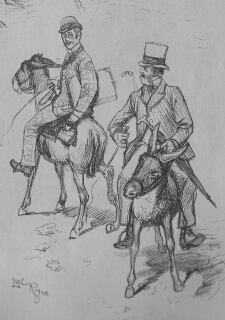
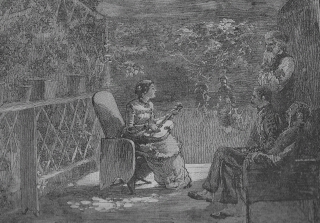
Space will not permit a detailed description of the pleasures of life at and about Uncle Pete's: walks
up the picturesque canyon; trips, under Antonio's watchful care, for some distance into the
mountains; rides on some of the many fine horses always ready for the saddle; and constant study of
the minutiae of this great and interesting industry of stock-raising.
As in more primitive days, the different herds ranged intermingled over the public domain, so do
they now stray from ranch to ranch, and at certain seasons of the year they must be collected and
separated. They are distinguished by ear-marks, and more especially by brands, said brands being
conclusive and universally accepted evidence of ownership. In June and July, and in September and
October, "rounding up" or the grand collection and separation, takes place. For each district a
master or director of the round up is chosen, whose orders are implicitly obeyed by the working
force, consisting of from twenty to fifty men, furnished by the ranchmen of the district in proportion to
their holdings. They have 2 or 3 horses apiece, and are accompanied by assistants, herders, cooks,
etc.
up the picturesque canyon; trips, under Antonio's watchful care, for some distance into the
mountains; rides on some of the many fine horses always ready for the saddle; and constant study of
the minutiae of this great and interesting industry of stock-raising.
As in more primitive days, the different herds ranged intermingled over the public domain, so do
they now stray from ranch to ranch, and at certain seasons of the year they must be collected and
separated. They are distinguished by ear-marks, and more especially by brands, said brands being
conclusive and universally accepted evidence of ownership. In June and July, and in September and
October, "rounding up" or the grand collection and separation, takes place. For each district a
master or director of the round up is chosen, whose orders are implicitly obeyed by the working
force, consisting of from twenty to fifty men, furnished by the ranchmen of the district in proportion to
their holdings. They have 2 or 3 horses apiece, and are accompanied by assistants, herders, cooks,
etc.
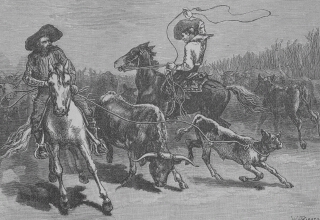
Starting from a given point, taking a regular course, and camping every night, they sweep over the
ranges. Each day they round up, the horsemen scour the country, and with the skill coming from
long practice, gather the cattle together. In vain does the restive steer break away and run back or
aside, the skillful horseman is ready for him, the trained horse "turns on a five-cent piece," and he is
headed off, and must yield to his fate, and move on in the preordained track. The round-up takes
place sometimes at a corral or large inclosure, sometimes on the open plain.
But, we must see for ourselves, and with the reckless disregard of "magnificent distances" which
characterizes this country, start for the round up at a corral on the great Craig or Barnum ranch.
So on a cool and pleasant afternoon the Colonel and the Commodore left the congenial
surroundings of Uncle Pete's estate and started upon another leg of our journey west.
ranges. Each day they round up, the horsemen scour the country, and with the skill coming from
long practice, gather the cattle together. In vain does the restive steer break away and run back or
aside, the skillful horseman is ready for him, the trained horse "turns on a five-cent piece," and he is
headed off, and must yield to his fate, and move on in the preordained track. The round-up takes
place sometimes at a corral or large inclosure, sometimes on the open plain.
But, we must see for ourselves, and with the reckless disregard of "magnificent distances" which
characterizes this country, start for the round up at a corral on the great Craig or Barnum ranch.
So on a cool and pleasant afternoon the Colonel and the Commodore left the congenial
surroundings of Uncle Pete's estate and started upon another leg of our journey west.